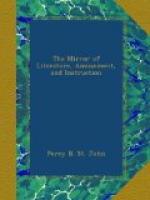At the time of the Reformation, sacred music, which had begun to run wild, was brought back to its first principles. The melodies of religious worship were rendered more heart-touching, by being set to words in the vernacular tongues, which every body could understand. Luther’s hymn, “Great God, what do I hear and see,” led the way. Henry VIII. hated the German reformer, and all that he did, but he burned to rival him in every thing, and he gave a stimulus to the public taste, by composing words and music for the service of the English church. In France, soon after the middle of the sixteenth century, when it was doubtful whether the nation would become Protestant or remain Roman Catholic, the pathetic tunes and devotional stanzas of the reformers obtained so great an influence over the minds of men, that the music of the temples, as the Protestant sanctuaries were called, to distinguish them from the Roman Catholic churches, became the fashionable melodies of the day. This taste found its way even to the court, and to the great alarm of the Romish party, some of the sweetest and most stirring of the psalms, which had been translated into French metre by Clement Marot, were set to music by Lewis Guadimel, and were constantly in the mouths not only of the Protestant families of the provinces, but of the ornaments of the saloons of Paris, and of the palace of the Louvre. It is said to have been quite astonishing how much this pious and simple device found favour for the Protestant cause, and induced people, who had never read Scripture before, to search the holy volume out of which those treasures were drawn, which so charmed their ears and their imagination. It is still the practice in most of the mountain churches to make sacred music a part of family devotion, and many of the tunes which Guadimel composed with such success are still sung to the praise of God. I can bear witness to the forcible manner in which these strains, rising to heaven from the lips of parents, children and domestics, quicken piety, and stir up the best affections of the heart towards God and man. I have seen and felt the effect produced by them in the humble dwelling of the village pastor, where none but human voices swelled the notes; and in the chateau, where the harp and the organ have mingled their fine sounds with the well modulated tones of an accomplished family of sons and daughters. My thoughts, at the moment I am writing this, are at Chateau Blonay, but most of the voices, which I heard there, are now silent in death! I am thoroughly convinced that family worship, and congregational worship lose a great auxiliary to piety, when there is not the power or the inclination to join in psalmody.
* * * * *
LINES
Written after reading the Memoir and Poems of Miss Lucretia Davidson.[2]




